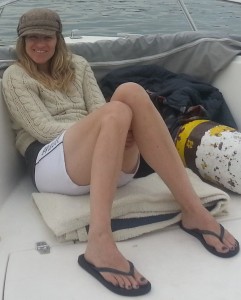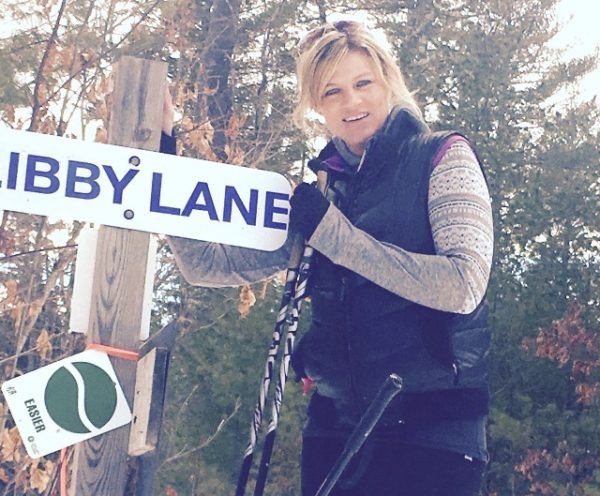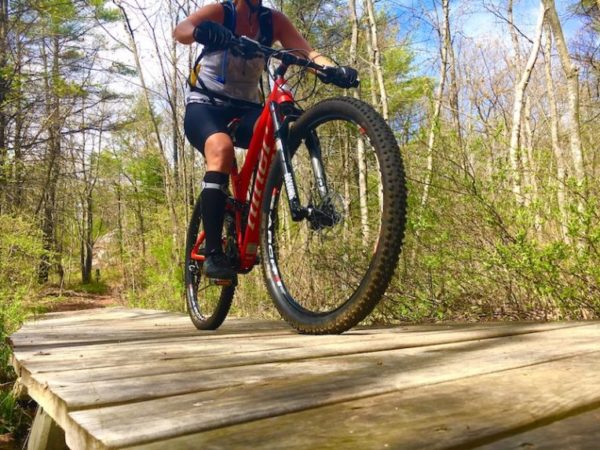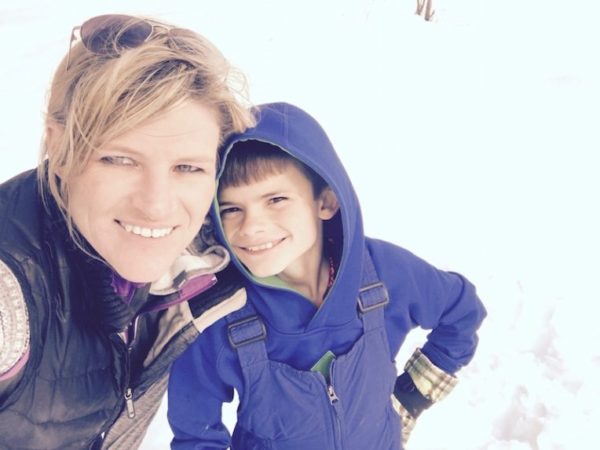 When I first met Amy Paquette in 2014, she was struggling. About a year and a half had passed since she’d had brain surgery for an aneurysm. It was repaired, but she continued to have unrelenting headaches that interfered with every aspect of her life.
When I first met Amy Paquette in 2014, she was struggling. About a year and a half had passed since she’d had brain surgery for an aneurysm. It was repaired, but she continued to have unrelenting headaches that interfered with every aspect of her life.
What is a brain aneurysm?
A brain aneurysm is a weak bulging spot on the wall of an artery in the brain. Picture a weak spot on a balloon or an inner tube. In the United States, one in 50 people has a brain aneurysm. Most are very small and don’t cause any symptoms. Some might be discovered by chance when a person has a test for another reason. Others can grow big enough to press on nerves in the brain and may cause double vision, drooping eyelids or pain behind the eye.
Aneurysms are most likely to cause symptoms when they rupture and blood leaks out of the artery into the spinal fluid surrounding the brain. When a rupture happens, it usually causes a sudden severe headache that people often describe as “the worst headache of my life.” Ruptures happen in about eight out of 100,000 people every year.
Amy’s story
Amy experienced sudden blurred vision and an unbearable headache. At first, doctors thought it was vertigo, but an MRI two weeks later revealed an aneurysm. She’s lucky she didn’t die. As grateful as she was that she survived, she was worn out physically and mentally because of the constant headaches she continued to endure after her surgery.
I met Amy at an Aneurysm Support Group that meets monthly in Portland, Maine. You can read more about her story and the support group in this blog post. One of the things that often happens at the meetings is that people share information about different therapies and medications that work or don’t work for them. Amy was taking a medication that was supposed to relieve her headache pain but didn’t.
No more headaches
She ended up seeing a brain specialist in Boston who said her lingering pain was likely due to nerve damage from her surgery. He switched her medication to one that targeted nerve pain. “Just changing that totally changed my life,” she said. “l felt relief within days. It was amazing. I got back on my snowboard and it wasn’t horrible and I started mountain biking again. I’ve been wakeboarding and hiking. I got my life back.”
She says she still gets a headache every once in a while, but usually only if she overexerts herself. She’s learned how far she can push herself. And she’s also learned that she has something to give back. Hope. Hope to other people who may be traveling down the same path she’s been on.
Nearly five years have passed since she found out she had an aneurysm. So much has changed in her life since then. “It puts everything into perspective,” she told me. “You find out who your real friends are and you evaluate your whole life. You take stock of what’s really making you happy in your life. You re-evaluate and prioritize better.”
Giving back
Amy has become involved with the Brain Aneurysm Foundation and plans to do some lobbying in Washington for research money. She says she will become more active in the Maine Aneurysm Support Group. She also follows a Facebook page for Aneurysm Survivors.
Not too long ago, she responded to a post by a woman who was feeling discouraged. She told her about some of the things that have helped her along the way. I’m going to end this post with Amy’s words of encouragement. They were meant for someone who’s had an aneurysm, but some of them could be for anyone who is struggling. Please pass them along
Amy’s advice
So sorry to hear you’re feeling like this, but please know everything you are experiencing is completely normal right now. Both advocating for yourself and getting much needed support will help you get to your happy ‘new normal’ sooner rather than later.
I know it may not seem it right now, but, you’re still you! ❤️ I thought a bit about some of the things that have helped me along the way on my own journey. I hope these help, even if just a little.
Advocate
Seek these out now
Neurologist
Search high and low (literally!) for a fantastic neurologist. This piece of your new puzzle is so important. Especially if you’re not particularly gelling with your Neuro now, find one with whom you mesh well. Do the research. Look on-line, read reviews, talk to people and other caregivers you trust; look into the best hospitals in your area, look out of your area. Your brain is worth the drive.
Meds
Make sure the Neuro you do end up with is caring and available to you, and that he/she will help adjust your pain and anti-depressant/anxiety meds as needed (let yourself take these just for now; they help a lot, and the risks are very low). Sleep is extremely important to the healing process too. Make sure whatever you are taking for meds is not preventing you from getting a good night’s sleep, but instead, may even help you get some zzz’s.
Get support
Don’t try to go it alone
Loved ones
Spend time with people who you know have unconditional love for you. A parent perhaps, a spouse, and/or a few close friends who somehow seem to understand how you’re feeling.
Unfortunately, most probably won’t and may even distance themselves for a bit. Try not to take this personally, it’s just how people act sometimes when they don’t understand, and when they don’t know how to act around someone who is in recovery following such a serious surgery.
It’s not a lot of fun being alone during this time. So, have a friend over for lunch, sit outside in the fresh air, or take a short walk when you’re ready. Make sure you’re getting your rest. Just having someone sit in the same room while you are resting may feel reassuring during this time.
Local Support Group
Find a local brain aneurysm survivor support group in your area. Even as a very “private” person, I found it incredibly helpful to talk about how I was feeling with a group of people who knew exactly where I was coming from. Bring a loved one with you to the group meeting.
A lot of times, you’ll also hear group members talk about different medications that have worked for them and those that haven’t. This was so helpful; I could then go back to my Neuro and ask about what I had learned from my peers in the group.
On-Line Resources
There are some great resources on the Brain Aneurysm Foundation’s (BAF) website, for you and your loved ones to learn more about what you’re going through. Look under ‘Patient Resources’ and then under ‘Caregivers’ and ‘Recovery’. This section will also assure you that what you are feeling right now is normal at this point in your recovery.
On-line communities exist as well (like the Facebook group, ‘Brain Aneurysm Survivors,’ with almost 5,000 members). Search out groups that make sense, try them out, and see which is truly a good fit, with like-minded people.
Other helpful info, I hope
One Goal
Each morning write down one goal you’re going to accomplish that day, whether it be ‘get up and walk to the bathroom by myself and then back to the bed/couch,’ or, ‘walk down the driveway to the mailbox and back’. If your recovery is at a point where you can do more than that, that is wonderful!
Set your goal according to what is achievable that day. In other words, if you’re ready to get out and take a short trip to a grocery or other store, that could be your goal. And go with a loved one! (Keep in mind, there is a lot of natural stimulation that occurs in a busy store that can be overwhelming post-brain surgery, so tread lightly on these types of loftier goals until you can make one that is comfortable for you.)
Hopefulness
It can be extremely difficult during this time, but keep telling yourself how you’re feeling right now is temporary. Think of what you have been through, and thank goodness for modern medicine! Do your best to remain hopeful knowing that things will get better.
You will lean on the ones closest to you for support, you will find a great doctor who can get you set up with a good combination of medication to help you through this painful time of recovery. You will take things day by day, setting small, achievable goals to show yourself that you can be successful. And it feels really good to be successful right now.
You might have some really dark times, where you are feeling so low and helpless. Continue to plug along, and do all of the above to help you get through them. Try to think positively, and surround yourself with people you trust and around whom you can be vulnerable. You will probably be crying a lot over the next few weeks, and that is okay. Again, all of this is normal right now.
To help you talk through some of these feelings, your doctor can recommend a psychologist or therapist of some kind. You just aren’t feeling like yourself right now. (Of course, you’re not, look what you’ve been through!) I found this to be very helpful at this time.
Find little things that soothe you and make you happy. Some of mine were:
- really soft, cozy socks
- a cinnamon/spice heating pad to put under my neck
- special ice packs for my head
- cozy pajamas
- a super, super soft blanket
- peppermint herbal tea
- a candle that smells like Christmas
- moisturizing lip balm
- lavender essential oil which I would dab lightly on my wrists, behind my ears and on my temple for relaxation
- favorite tv shows and movies on DVD
These little things created so much comfort to me during my recovery.
Keep your chin up and remain hopeful. Above all, remember: things will get better. You are an incredibly strong person and getting stronger each and every blessed day. Keep up the great work, my friend! ❤️
For Amy, life is good again
Amy is a third-grade teacher and the mother of three active boys, aged 14, 12, and 10. Now that she doesn’t have to endure the headaches, they get to do a whole lot more together, which makes her feel happy and oh, so grateful. “We LOVE to go snowboarding together and hiking,” she told me. “We’ve even all done a snowboard race together. Very fun! The boys come mountain biking with me, too. They’re going to come with me a lot more this summer!”
More information
If you would like to learn more about brain aneurysms, visit the Brain Aneurysm Foundation website. Maine’s Brain Aneurysm Support Group meets the last Thursday of the month at 6 pm at the Dana Center at Maine Medical Center in Portland. For more information about the group, visit the Maine Brain Aneurysm Awareness website or Facebook page.




Leave A Comment